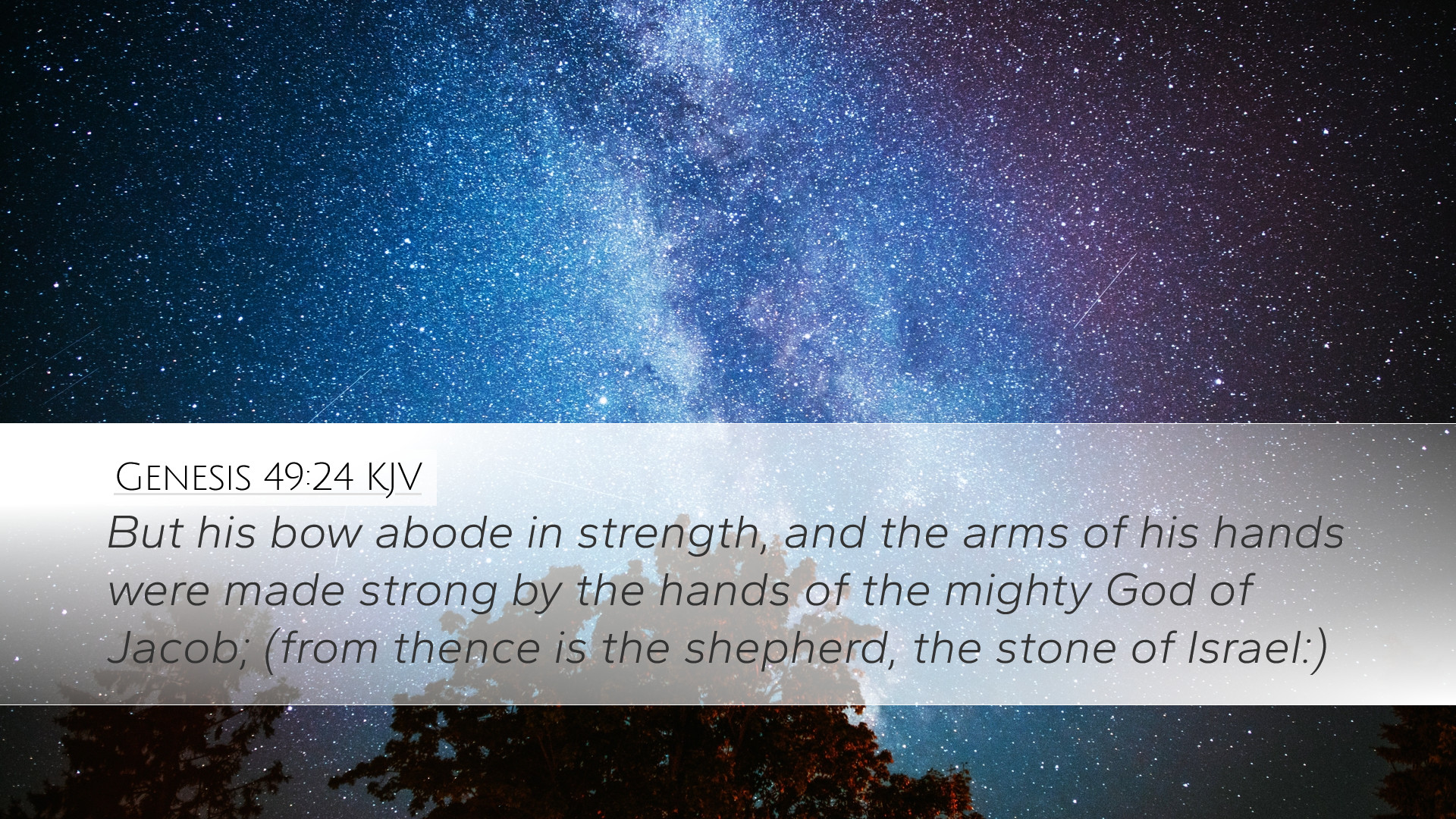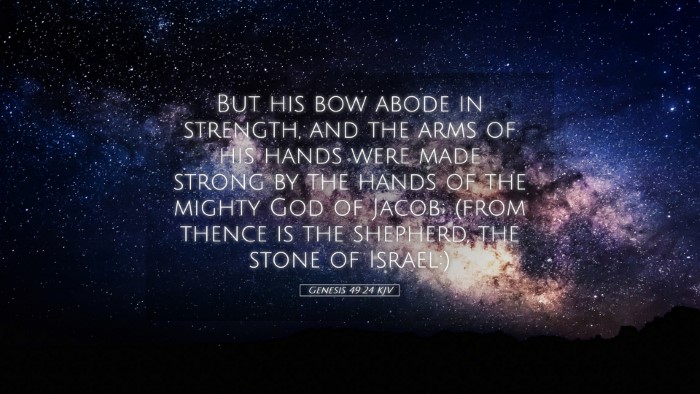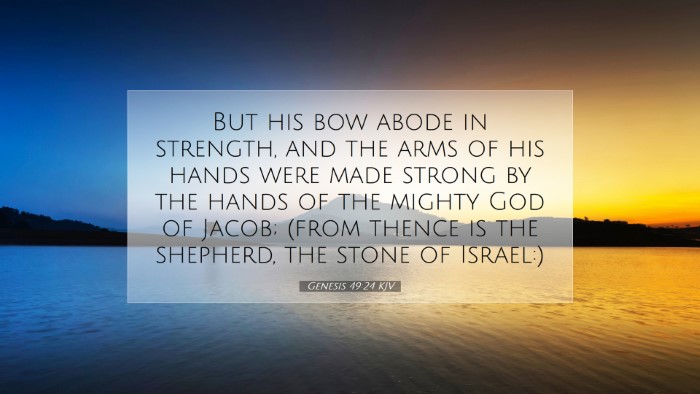Genesis 49:24 - A Commentary
Genesis 49:24 states, "But his bow remained strong, and his arms were made agile by the hands of the Mighty One of Jacob; from there is the shepherd, the stone of Israel." This verse is part of Jacob's prophetic blessing upon his sons, particularly focusing on Joseph. The depth of this blessing provides profound insights into Joseph's character and the divine favor upon his life.
Contextual Background
The context of Genesis 49 is critical as Jacob gathers his sons to pronounce blessings and prophecies concerning their futures. This moment is steeped in significance, as Jacob reflects upon his family’s history, and Joseph, who faced immense trials yet triumphed, stands as a central figure. In this blessing, Jacob alludes to God's providential care and strength imparted to Joseph.
Insights from Matthew Henry
Matthew Henry in his commentary emphasizes the depiction of Joseph as a figure who displays unwavering strength amid adversity. He notes the phrase "his bow remained strong" indicates Joseph’s resilience and steadfastness under pressure. Henry highlights that this strength was not inherent but derived from divine assistance, seen in the reference to the "Mighty One of Jacob."
-
Divine Strength:
Henry elaborates that the strength of Joseph’s bow symbolizes his ability to endure and prosper despite centuries of struggles, suggesting that it is God who equips His people to face life's challenges.
-
The Agile Arms:
The mention of "his arms made agile" speaks to Joseph's readiness to act and his capability to respond to God’s leading. This agility signifies not only physical prowess but also spiritual readiness—a key trait for leadership.
-
The Shepherd and Stone:
The interpretation of Joseph as "the shepherd, the stone of Israel" serves to elevate his role in guiding the nation and establishing spiritual foundations. Joseph, though not the patriarch himself, assumes a mantle that would influence the future of Israel.
Insights from Albert Barnes
Albert Barnes approaches this verse with a focus on the theological implications of the blessings pronounced by Jacob. He points out that Joseph's "bow" represents not only his strength but also his ability to defend his family and nation against adversity.
-
Symbol of Defense:
Barnes interprets Joseph’s bow as a symbol of military strength and divine support, implying that God, the "Mighty One," grants power to His chosen ones for protection against enemies.
-
Metaphorical Richness:
Barnes discusses the metaphorical richness of being "made agile," which can denote a divine enabling that allows individuals to function effectively in their God-given roles, emphasizing that this agility is also a spiritual preparation for leadership.
-
Prophetic Significance:
He also notes the broader prophetic significance found in the terms "shepherd" and "stone," pointing out that they foreshadow the future leaders of Israel who are to come from Joseph's lineage, establishing a foundation for the faith community that would endure.
Insights from Adam Clarke
Adam Clarke adds further depth to this discussion by reflecting on the metaphor of the shepherd and stone in relation to Joseph’s character and influence. Clarke posits that Jacob's blessing encapsulates Joseph’s role as a caretaker and stabilizer in Israel's narrative.
-
Caretaker Role:
Clarke highlights the significance of the term "shepherd," suggesting that it underlines Joseph's protective nature towards his family during periods of famine and strife, serving as a model for pastoral leadership.
-
Foundation of Character:
The reference to "the stone of Israel" designates Joseph’s role as foundational in maintaining the integrity and strength of the nation, portraying him as a steadfast leader whose character would support and uphold the people during difficult times.
-
Spiritual Legacy:
Clarke asserts that Joseph's legacy is not merely historical; it serves as a spiritual template for contemporary leaders. His faithfulness to God and commitment to his family exemplify qualities that should resonate within today's pastoral and spiritual communities.
Theological Implications
The overarching themes from these interpretations highlight several critical theological implications relevant to pastors and theologians:
-
Divine Empowerment:
The strength of Joseph serves as a reminder of how God empowers His people for the tasks at hand. It illustrates the need for reliance on divine strength to navigate the challenges of leadership.
-
Spiritual Readiness:
The agility of Joseph’s arms speaks to the necessity for spiritual readiness and responsiveness to God's guidance in pastoral ministry.
-
Leadership and Legacy:
The characterization of Joseph as the "shepherd" and "stone" provides a framework for understanding leadership within the community of faith, emphasizing stability, protection, and the nurturing of future generations.
Conclusion
Genesis 49:24 stands as a powerful testament to the work of God in the life of Joseph, affirming that strength, agility, and purpose are all gifts from the "Mighty One" who equips His followers. The insights from Matthew Henry, Albert Barnes, and Adam Clarke collectively portray Joseph not merely as a historical figure, but as an enduring source of wisdom for contemporary leadership within the Church. As leaders reflect upon Joseph's story, they are encouraged to seek divine empowerment, maintain spiritual readiness, and strive for a legacy of strength and guidance for their congregations.


